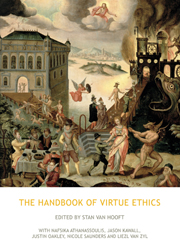Book contents
- Frontmatter
- Contents
- Acknowledgements
- 1 Introduction
- PART I NORMATIVE THEORY
- PART II TYPES OF VIRTUES
- PART III APPLIED ETHICS
- PART IV THE PSYCHOLOGY OF VIRTUE
- 35 Constancy, fidelity and integrity
- 36 Sympathy
- 37 The problem of character
- 38 Situationism and character: new directions
- 39 Educating for virtue
- 40 Literature, arts and the education of virtuous emotion
- 41 Virtue ethics for skin-bags: an ethics of love for vulnerable creatures
- Contributors
- References
- Index
41 - Virtue ethics for skin-bags: an ethics of love for vulnerable creatures
from PART IV - THE PSYCHOLOGY OF VIRTUE
- Frontmatter
- Contents
- Acknowledgements
- 1 Introduction
- PART I NORMATIVE THEORY
- PART II TYPES OF VIRTUES
- PART III APPLIED ETHICS
- PART IV THE PSYCHOLOGY OF VIRTUE
- 35 Constancy, fidelity and integrity
- 36 Sympathy
- 37 The problem of character
- 38 Situationism and character: new directions
- 39 Educating for virtue
- 40 Literature, arts and the education of virtuous emotion
- 41 Virtue ethics for skin-bags: an ethics of love for vulnerable creatures
- Contributors
- References
- Index
Summary
‘Tis an absolute and, as it were, a divine perfection, for a man to know how loyally to enjoy his being. We seek other conditions, by reason we do not understand the use of our own; and go out of ourselves, because we know not how there to reside. ‘Tis to much purpose to go upon stilts, for, when upon stilts, we must yet walk with our legs; and when seated upon the most elevated throne in the world, we are but seated upon our breech. The fairest lives, in my opinion, are those which regularly accommodate themselves to the common and human model; without miracle, without extravagance.
Michel de Montaigne (1603)Where there is no need there is no love.
Philip Hallie (1997)PREAMBLE
Virtue is a precarious victory. Our characters are shaped by the moving sands of time, making it so that ethical integrity can never be guaranteed. We have little idea of what tomorrow has in store, and this has as much to do with ignorance about the future as it does with the rickety nature of human existence. We simply do not know what will come of us, how our characters will be transformed. Whatever ideas we may have of our future personas are an amalgam of wish and highly inconclusive evidence. At some level we know these anxiety-inducing things, and we needily stretch out to others and embed our lives in a protective field so as to help assuage our fears.
- Type
- Chapter
- Information
- The Handbook of Virtue Ethics , pp. 461 - 472Publisher: Acumen PublishingPrint publication year: 2013

